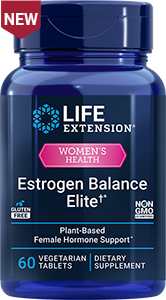
Estrogen Supplements: How Do They Work?
Published: July 2022 | Updated: January 2025
Estrogen is one of your sex hormones and it's vital for your well-being. However, age-related hormonal changes during perimenopause and menopause impact your levels. As if dealing with those monthly cyclical changes when we were younger wasn't enough (yes, we mean you, menstrual cycle!).
Hormonal changes are a natural part of our ever-changing physiologies, but that doesn't mean experiencing a decline in estrogen is a picnic. There's nothing fun about feeling fatigued by the end of the day or pesky night sweats while you're trying to get some shut-eye, not to mention mood swings, hot flashes and just feeling off. And forget about bedroom fun when you're dealing with vaginal discomfort.
Fortunately, women who want to maintain a healthy hormone balance have options, including vitamins and products, sometimes labeled estrogen supplements, that can help.
Spoiler alert: What we call "estrogen supplements" don't contain estrogen per se, although they may support healthy estrogen balance; yes, that's a little confusing, but we'll explain in more detail as you keep reading. We asked Dr. Vanessa Pavey, ND, for the lowdown on how estrogen-supporting supplements work and how they can help with the inevitable hormonal transitions.
What is estrogen?
Estrogen, a sex hormone or a class of steroid hormones (progesterone is another one), is made by both women and men, explained Dr. Pavey. For women, its primary role is in supporting reproductive health. The body produces three main estrogens. Each form tends to be more dominant at different phases of a woman's life:
Estradiol
—This steroid hormone is the most powerful form of estrogen produced by the ovaries.Estriol
—Estriol is the body's main form of estrogen during pregnancy.Estrone
—This is the main form of estrogen during menopause, and it's mainly produced by fat cells.
While estrogen is a significant player in sexual and reproductive health (including libido), this hormone has other roles, including influencing:
- Bone and muscle mass
- Collagen production
- Cholesterol levels
- Circulation
- Blood sugar levels
- Cognitive performance
- Cardiovascular health
How does aging affect your estrogen levels?
The ovaries produce less estrogen as we age, which typically begins as you approach your 40s. "Women may notice their menstrual cycles become longer or shorter and more or less frequent due to changes in hormone levels," explained Dr. Pavey.
Eventually, these changes usher in perimenopause and then menopause. Skipping periods or irregular periods are common perimenopause markers. And menopause happens when there hasn't been a period for 12 months. During these transitions, women may experience other discomforts like hot flashes, vaginal dryness, and night sweats.
This hormonal transition leaves post-menopausal women with low estrogen, which can also impact bone and muscle mass, weight, mood, cognition and cardiovascular health. That's why it's crucial to learn about your body and find ways you can complement your diet with vitamins and nutrients that support optimal well-being at any age.
Pro tip: If you're concerned about low estrogen levels impacting vitamin D status, speak with your doctor about adding a dietary supplement to your daily routine. The sunshine vitamin supports bones, cognition, immune health and other biological functions. Healthy vitamin D levels are especially important for menopausal and post-menopausal women.
How do estrogen supplements work?
In a nutshell, what we call "estrogen supplements" offer specific nutrients that can have an estrogen-like effect on your body. Let's break this down:
Cell communication:
First, let's go over how your cells work. Your body has an intricate biological mechanism that allows it to interact with the variety of proteins and hormones in our bodies, as well as the nutrients and compounds from our foods to support biological processes. Every cell (be it a skin, liver, brain, stomach, or reproductive tissue cell) has receptors on its surface that can bind to specific compounds. Each receptor has a compound-specific shape, so both the receptor and compound fit together like puzzle pieces.Estrogen receptors:
These receptors have a strong attraction for, you guessed it, estrogen. As Dr. Pavey explained, there are two types of estrogen receptors: alpha and beta, and each is predominant in different tissues. Alpha estrogen receptors are primarily found in reproductive tissues (think breasts, ovaries and uterus). In contrast, beta estrogen receptors are found in non-reproductive tissues like bone, skin, blood vessels and brain. "Activating beta estrogen receptors in peripheral tissues can help promote beneficial effects on these organs and can help relieve menopausal symptoms," added Dr. Pavey.Phytoestrogens:
Your body's estrogen receptors are also attracted to phytoestrogens, naturally occurring compounds found in certain plants (and as extracts in supplements). Phytoestrogens can bind to your cells' estrogen receptors and can exert an estrogen-like effect on the body. But their effect is weaker than human hormones or concentrated hormone products.
So while estrogen supplements don't contain estrogen, the phytoestrogen nutrients in them can trigger a similar impact on your body as actual estrogen. "The biochemical effect of phytoestrogens is weaker than the actual estradiol hormone; still, nutrients supplied in estrogen supplements can help relieve common menopausal symptoms," Dr. Pavey explained.
Do supplements increase estrogen levels?
No, estrogen supplements don't generally increase estrogen production in the ovaries, explained Dr. Pavey. But supplementation of the right vitamin or nutrient can complement an estrogen-friendly lifestyle.
Estrogen supplements supply the body with nutrients like soy isoflavones or indole-3-carbinol from cruciferous vegetables, which supports normal estrogen metabolism. What does metabolism have to do with these sex hormones? This cascade of biological events is how your body maintains homeostasis, the natural state of equilibrium from head to toe and inside out, including balanced hormone levels.
Explore Our Best Women's Health Supplements
10 nutrients for healthy estrogen levels
You can help relieve menopausal symptoms (as well as perimenopause) by incorporating the following 10 estrogen-supporting nutrients that help keep estrogen and progesterone metabolism healthy.
Fenugreek extract
—Clinical data shows that a specific fenugreek extract helps support healthy estrogen levels and can help relieve symptoms associated with hormone-related changes in women going through menopause.Soy
—This meat alternative offers one of the best-studied isoflavones, explained Dr. Pavey. Soy is a rich source of isoflavones, dietary phytoestrogens that can bind to the estrogen receptors and help relieve menopausal discomforts. Supplements containing the isoflavone genistein have been shown to help ease hot flashes.Flax seeds
—This superfood is a terrific dietary source of lignans. These types of well-studied phytoestrogens have antioxidant properties and help relieve menopause-related discomforts.Red clover
—This is another excellent source of isoflavones. It has a long history of supporting women's health. Some studies have shown that red clover extract can support bone health in premenopausal and menopausal women.Chasteberry
—Also known as Vitex agnus-castus, chasteberry contains compounds that can help ease menopausal discomforts, explained Dr. Pavey.Dong quai
—Known by its scientific name Angelica sinensis, this herb is commonly used to ease menopause-related symptoms.Broccoli extract
—Cruciferous vegetables like broccoli, Brussels sprouts, cauliflower, and cabbage are rich sources of indole-3-carnbinol. Your body converts I3C into diindolylmethane (DIM), another critical compound for healthy estrogen metabolism. Broccoli extracts that contain DIM and I3C help promote the formation of more "good" estrogen compounds instead of the less favorable ones, explained Dr. Pavey.Vitamin B6
—Your B-complex vitamins are essential to overall health, but to support your mood, especially during menopause, you want B6. While this vitamin won't "boost" your estrogen levels, it has been shown to combat the effects of high estrogen. "Out of all the B vitamins, B6 is essential to producing serotonin, one of your "feel-good" neurotransmitters. Estrogen may affect serotonin levels because it's involved in the production and breakdown of this brain chemical," noted Dr. Pavey.Pro tip: Your body needs the active form of B6. Although your body can convert inactive vitamin B6 to its active form, you can find supplements that deliver biologically active B6.
Boron
—This essential mineral is needed only in small amounts. Still, boron is essential for estrogen and vitamin D metabolism, bone health, and magnesium absorption. Low estrogen can impact bone health, increasing the risk for bone density loss. "During menopause, women need to be more vigilant about bone health. And boron is a trace mineral that can be overlooked," added Dr. Pavey.Siberian rhubarb
—You'll find this nutrient as an extract in menopause supplements. This root extract can be a terrific alternative to soy products that also help alleviate menopause-related symptoms. "Its active components have an attraction for the beta estrogen receptors, and it could explain why it provides up to 83% reduction in total menopausal discomforts," explained Dr. Pavey.
Note: If you have a history of estrogen-dependent health concerns, or are being treated for low estrogen, speak with your doctor before consuming phytoestrogens.
Pregnenolone and DHEA: Top Estrogen Supplements
Here's an exception to the (general) rule. While most estrogen supplementation won't budge your estrogen production, DHEA and pregnenolone can impact your hormone levels. For starters, DHEA is the most abundant hormone in the human body, and both DHEA and pregnenolone are precursor hormones. That means the body uses them as a starting point to produce most any sex hormone it needs at any given moment.
In other words, the body can use DHEA and pregnenolone to produce hormones like estrogen or testosterone, effectively increasing circulating levels in the bloodstream. So, supplementation with either of these hormones can help support estrogen and testosterone levels. Speak with your doctor before you add supplements to your daily routine.
5 life hacks to support healthy estrogen levels
Help your body support hormone balance by building sustainable daily habits—when you focus on supporting overall wellness, your hormone health will follow! Plus, adding vitamins and other supplements can help support healthy nutrient levels.
Don't know where to start? Here are five ways you can help your body promote hormone balance.
Connect with your body
—Learn to recognize discomforts as ways in which your body communicates with you. In other words, it's letting you know that there's something you need to address in your metabolism. Maybe it's vitamin D levels, or perhaps it's estrogen dominance (where there's high estrogen in relation to progesterone). Picking up on discomforts you're experiencing allows you to make changes (in your diet or daily habits) that can significantly improve your quality of life.Eat phytoestrogen-rich foods
—Incorporating isoflavones-rich foods like soy and flax seeds into your meals can help support estrogen balance.Pro tip: When possible, buy organic or non-GMO foods. These food items follow strict guidelines that ensure the products you're consuming don't have added hormones or antibiotics that might impact your hormone balance.
Don't forget your cruciferous vegetables
—Veggies like broccoli, cabbage, kale, and cauliflower provide compounds like indole-3-carnbinol that can help support healthy estrogen metabolism.Keep moving
—The whole-body health benefits of exercise are undeniable, and they go beyond lean muscle mass or even a brain boost. Incorporating a regular exercise routine into your days can keep your hormones balanced and potentially help improve menopause-related complaints.Manage stress
—It's no secret that unmanaged stress can take a toll on your overall health. That overload of cortisol can impact menopause-related discomforts like hot flashes. Practice strategies that help you calm yourself and stay "cool" when facing daily stress.
The best "you" is yet to come
Granted, it's not easy to be enthusiastic about the changes of menopause, like hot flashes, night sweats, mood swings and other discomforts. But, as our bodies find balance throughout the hormonal readjustment, we can learn to embrace the changes that perimenopause and menopause bring—whether it's laugh lines that come from a thoroughly enjoyed life, a mane of shining gray hair, or well-earned wisdom. With a healthy lifestyle, thoughtful nutrition, and a great relationship with your healthcare provider, you can emerge from this inevitable life transition a stronger, more confident woman.
Pro tip: Own your wellness. If you're concerned about menopause, you can take a women's health quiz to find vitamins, herbs and supplements that support hormone balance.
References
- Beck SG, Handa RJ. "Steroidogenic pathway showing the central position of DHEA in synthesis of testosterone and estradiol." Endocrinology. March 2004.https://academic.oup.com/view-large/figure/54035172/zee0030401070001.jpeg
- Calado A, et al. "The Effect of Flaxseed in Breast Cancer: A Literature Review." Frontiers. February 2018. https://www.frontiersin.org/articles/10.3389/fnut.2018.00004/full
- D'Anna R, et al. "Effects of the Phytoestrogen Genistein on Hot Flushes, Endometrium, and Vaginal Epithelium in Postmenopausal Women: A Two-Year Randomized, Double-Blind, Placebo-Controlled Study." Menopause. April 2009. https://pubmed.ncbi.nlm.nih.gov/19034051/
- Delgado BJ, Lopez-Ojeda W. "Estrogen." StatPearls. December 2021. https://pubmed.ncbi.nlm.nih.gov/30855848/
- Fowke JH, et al. "Brassica Vegetables Consumption Shifts Estrogen Metabolism in Healthy Postmenopausal Women." Cancer Epidemiol Biomarkers Prev. August 2000. https://pubmed.ncbi.nlm.nih.gov/10952093/
- Fritz H, et al. "Soy, Red Clover, and Isoflavones and Breast Cancer: A Systematic Review." PLOS ONE, November 2013. https://journals.plos.org/plosone/article?id=10.1371/journal.pone.0081968
- Geller S, Studee L. "Soy and Red Clover for Midlife and Aging." Climacteric. August 2006. https://www.ncbi.nlm.nih.gov/pmc/articles/PMC1780039/
- Lobo RA, et al. "Back to the Future: Hormone Replacement Therapy as Part of a Prevention Strategy for Women at the Onset of Menopause." Atherosclerosis. November 2016. https://pubmed.ncbi.nlm.nih.gov/27745704/
- Mahboobifard F, et al. "Estrogen as a key regulator of energy homeostasis and metabolic health." Biomed Pharmacother. December 2022. https://pubmed.ncbi.nlm.nih.gov/36252357/
- Miller WL, Auchus RJ. "The molecular biology, biochemistry, and physiology of human steroidogenesis and its disorders." Endocr Rev. February 2011. https://pmc.ncbi.nlm.nih.gov/articles/PMC3365799/
- Paredes S, et al. "An Association of Serotonin with Pain Disorders and its Modulations by Estrogen." Int J Mol Sci. November 2019. https://pubmed.ncbi.nlm.nih.gov/31731606/
- Thomas JV, et al. "Phytoestrogenic effect of fenugreek seed extract helps in ameliorating the leg pain and vasomotor symptoms in postmenopausal women: A randomized, double-blinded, placebo-controlled study." PharmaNutrition. December 2020. https://www.sciencedirect.com/science/article/abs/pii/S2213434420300347
- van Die MD, et al. "Vitex Agnus-Cactus (Chaste-Tree/Berry) in the Treatment of Menopause-Related Complaints." J Alt Complement Med. August 2009. https://pubmed.ncbi.nlm.nih.gov/19678775/
- Williams DE. "Indoles Derived From Glucobrassicin: Cancer Chemoprevention by Indole-3-Carbinol and 3,3'-Diindolylmethane." Front Nutr. 2021. https://www.ncbi.nlm.nih.gov/pmc/articles/PMC8517077/
- "Angelica sinensis (Dong quai)." Alt Med Rev. https://altmedrev.com/wp-content/uploads/2019/02/v9-4-429.pdf
- "Cruciferous Vegetables." Data on file.
- "Estrogen." Cleveland Clinic. https://my.clevelandclinic.org/health/body/22353-estrogen
- "Dan Gui Root." AHP Monographs. https://herbal-ahp.org/online-ordering-dang-gui-root/
- "Estrogen Dominance." U.S. Department of Veterans Affairs, https://www.va.gov/WHOLEHEALTHLIBRARY/tools/estrogen-dominance.asp
- "Estrogen's Effects on the Female Body." Johns Hopkins Medicine. https://www.hopkinsmedicine.org/health/conditions-and-diseases/estrogens-effects-on-the-female-body
- "Hormones and the Endocrine System." Johns Hopkins Medicine. https://www.hopkinsmedicine.org/health/conditions-and-diseases/hormones-and-the-endocrine-system
- "Isoflavone." Science Direct. https://www.sciencedirect.com/topics/chemistry/isoflavone
- "Lignans." Data on file.
- "Pregnenolone." Endocr Rev. February 2011. https://www.ncbi.nlm.nih.gov/pmc/articles/PMC3365799/figure/F3/
- "Soy Isoflavones." Data on file.
- "Straight Talk About Soy." Harvard T.H. Chan School of Public Health. https://nutritionsource.hsph.harvard.edu/soy/
Like what you read?
Please subscribe to get email updates on this blog.










